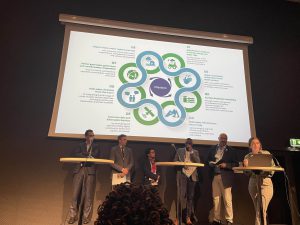World Water Week is the leading conference on global water issues. A non-profit event, co-created with leading organizations in 1991, World Water Week works to develop solutions to the world’s greatest water-related challenges. Conference topics range from climate change, food security, water security, and health to agriculture, water stewardship, technology, and biodiversity.
This year’s conference was held online and in person in Stockholm, Sweden during August 20-24th. The theme Seeds of Change: Innovative Solutions for a Water-Wise World, invited participants to rethink how water is managed.
World Water Week tackled some big questions this year such as: which ideas, innovations, and governance will be needed in a more unstable and water scarce world?
Brown and Caldwell’s conference attendees highlighted the following three themes with the potential for significant impacts to our collective water security and resilience.
World Water Week Theme: Inspiring Innovation
From exploring new ideas for improved outcomes to inspiration for better ways to manage our resources, across the world there is a plethora of innovation occurring with the goal of securing a better water future. During the conference, innovative perspectives shared ranged from public-private partnerships and water financing to innovative policy. Innovation can take many forms. Beyond technology, sessions focused on innovative methods to inspire improved governance, new funding mechanisms (i.e., tariffs, taxes, transfers), and creative financing to bridge the gap. Even if all these innovations can be implemented, it will not be enough if we do not accelerate our pace.
Innovative solutions to water challenges should be sustainable, equitable, cost-effective, and climate resilient. These approaches and solutions result in a net positive and enduring change for the benefit of our environment and our communities.
Solutions should incorporate our relationship with nature and improve governance strategies. Working with nature’s resiliency and the environment, instead of against it, has the potential to result in more efficient and effective outcomes with fewer resources.
To explore innovative solutions and facilitate evidence-based decision-making we need accessible and standardized water data. Digital technologies facilitate modeling, monitoring, and management of water resources in real-time and more effectively optimizing water use and reduce freshwater consumption. As more facilities implement digital water solutions, the industry must develop and adopt best practices to securely store and share data in ways that enable model advancement, improve water use and treatment, and inform capital planning.
World Water Week Theme: Fostering Collaboration
Collaboration among key stakeholders is a cornerstone for impactful outcomes within a watershed. Having the foresight to approach water solutions with awareness of the downstream impacts of waterways requires collective action. The bottom line? Taking a holistic view, like that of our 1Water approach, and innovative solutions with the entire water cycle in mind, results in the most sustainable and enduring solutions for our environment and communities.
Addressing our watershed challenges requires collaboration between the public and private sectors to achieve impact at scale. We’ve seen the value of successful public-private partnerships in action, from restoring water systems to recharging groundwater. Collective action is needed to establish water security, water independence, and allow protection of our environments.
Reimagining our economic, governance, and financing frameworks will be key to creating better synergy and enabling partnerships. As we look to realize better water solutions and outcomes, we need new approaches in alignment with political and financial systems. This forward-leading approach can promote new levels of water stewardship for businesses and our communities.
Collaboration should bring together technical, social, and process innovations. The days of old-fashioned, siloed thinking are behind us. Collaborative, innovation ecosystems are creating a new paradigm where members from various organizations collaborate for the mutual benefit of all stakeholders. This kind of collaboration uses technology and a community-based approach to identify and tackle complex problems by bringing together corporations, governments, academia, policy makers, utilities, and start-ups for positive outcomes. This generates more impactful, holistic solutions that apply innovation across sectors and with communities to overcome our challenges.
World Water Week Theme: Accelerating Water Action
Climate change and water are intrinsically linked. As often stated, “if climate change is the shark, water is its teeth.” The time is now to accelerate progress, commitments, and actions for improved water quality, quantity, and availability. It’s going to take collective action to repair the global water crisis we have triggered. If we get it right, we can tackle the water crisis and climate change while also reducing community vulnerability and inequality.
Current global investments in water are not enough to meet the UN’s Sustainable Development Goal 6 and to address climate impacts. According to the UN World Water Development Report 2023, progress toward all targets is off-track and in some areas the rate of implementation needs to quadruple or more. Water use is projected to increase by 1% per year through 2050. Without prioritization of water investments, water scarcity, stress, and availability have the potential for disastrous global impacts on our communities and environments.
Funding progress requires working at different scales with multi-stakeholder cooperation across sectors and borders. Cooperation from creative funding to water-related investments has been shown to improve water governance and decision-making, stimulate innovative solutions, and leverage efficiencies. Water is undervalued, hence stimulating sustainable funding starts with reframing how returns on investment will be met.
There is no one-size fits all solution. The right solution is empowered by actionable data and rooted in the needs of the community. As collaborative water actions gain momentum, evaluating water and watershed investments to systematically evaluate these opportunities will result in predictable, measurable outcomes. Our communities will be better served if we listen to their needs first. We need to listen to the Indigenous perspective and leverage their ancestral knowledge. As Dr. Milika Sobey said, “People thrive on respect, reciprocity, and treating everyone as equals.”
What’s Next?
World Water Week is one forum of global collaboration focused on advancing solutions to the global water crisis. As stewards of water, we are continually looking for ways to improve our use of this finite resource on behalf of our communities. Engaging in the global conversation in Stockholm and other international forums such as the United Nations’ Water Conference and the recent Water Environment Federation’s ‘Circular Water Economy Summit’, is one way we are advancing the conversation. As water professionals, we have a role to move from ambition to action.
Learn more about how BC is helping municipal and private sector clients take actionable steps to address water challenges:
- See how we’re helping clients advance ESG and water stewardship goals
- See how we’re helping to prepare for impacts from climate change and increasing resilience




